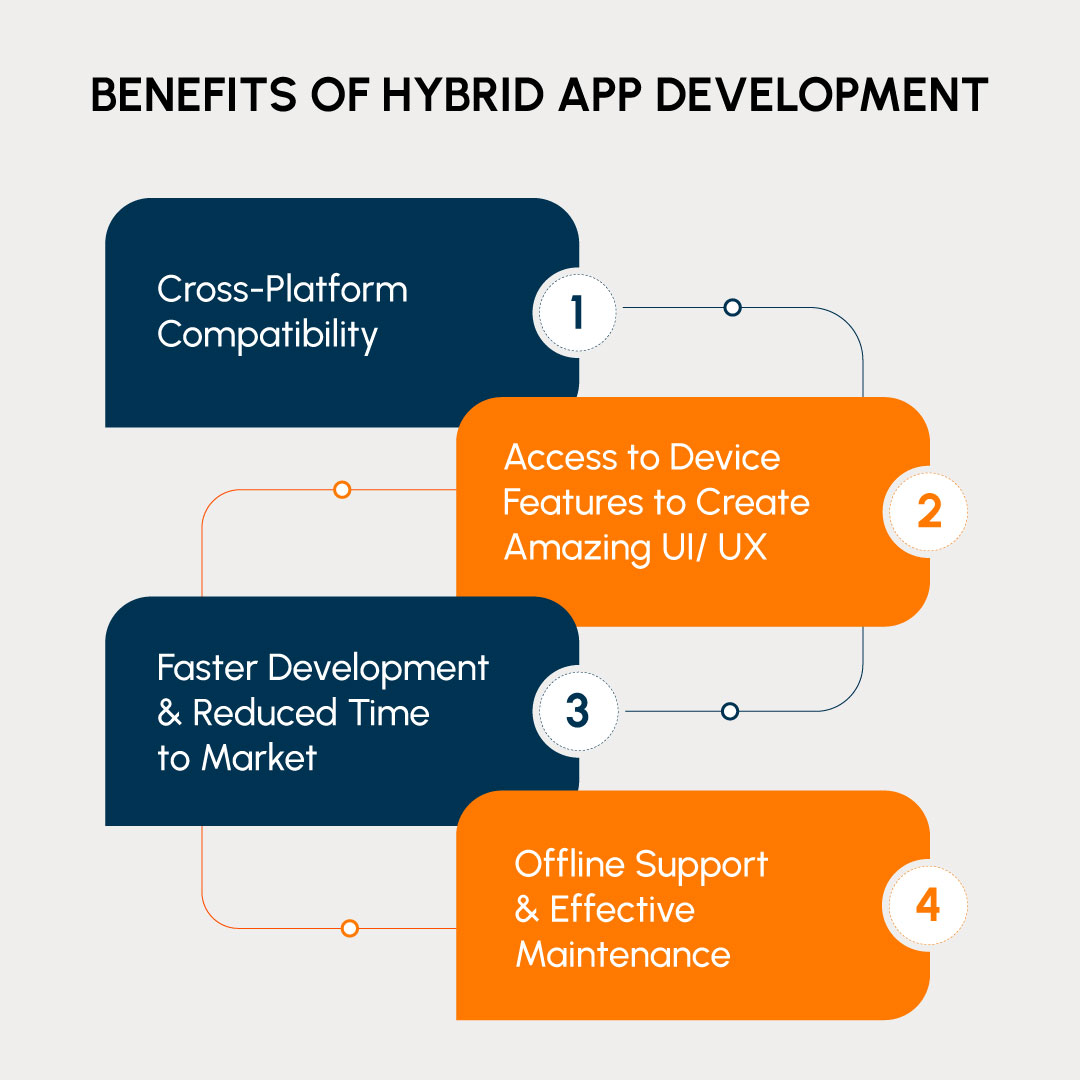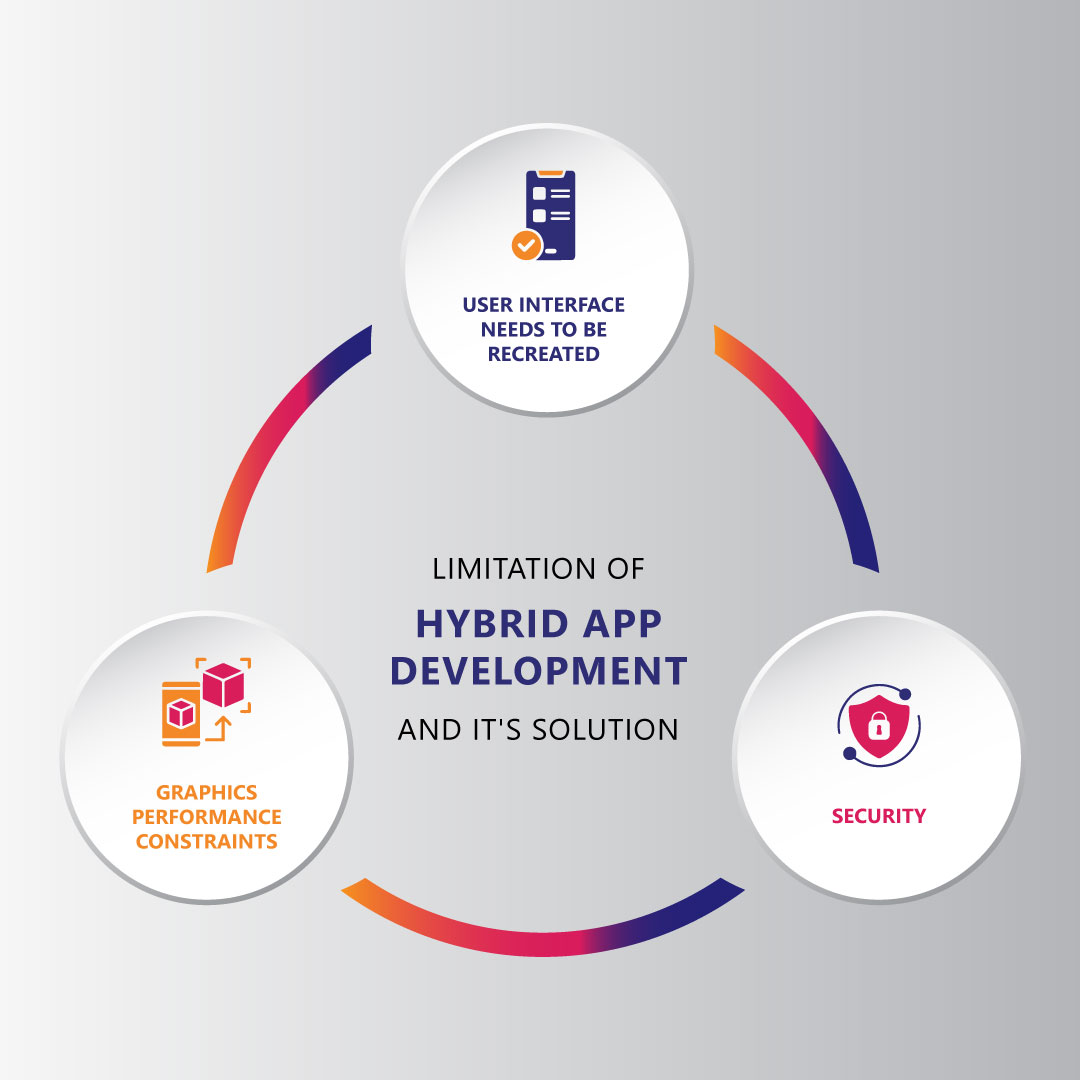Hybrid app development has gained significant momentum in IT in recent years. Businesses seek efficiency and a broader market reach. Native or web apps, though robust, require separate development for each platform. That is a costly and time-consuming endeavour. However, hybrid apps offer a blend of efficiency and cross-platform compatibility.
Hybrid apps combine the best of both web and native app worlds—the efficiency of web development and the native-like performance of native apps. These apps are based on a single codebase that caters to multiple platforms. Businesses benefit from hybrid apps by leveraging their versatility.
A range of powerful tools have emerged to simplify and accelerate the app development process, enhancing your hybrid app development journey.
In this blog, we will discuss the hybrid app development structure, its benefits and how to overcome some of its limitations.
Understand Hybrid App Development Framework
Hybrid apps blend native and web solutions. The application's core is written using web technologies such as HTML, CSS, and JavaScript and then encapsulated within a native application. Plugins are used so that these apps access the mobile device's features.
To better understand the hybrid app development structure, let's break down the process in simple words.The core part of a hybrid mobile application is written just like an application with HTML, CSS, and JavaScript. However, unlike a web-only application, it is run in its own embedded browser from within a native application. For example, an iOS application uses WKWebView, and an Android application uses WebView to display our application. This code is embedded into a native application wrapper using a powerful hybrid app development tool. The wrapper creates a native shell application just the platform's web view component. It will load your web application.
Tools like Apache Cordova (PhoneGap) or Ionic's Capacitor allow you to create and publish accurate native applications for sale in the platform's app stores.
Cordova and Capacitor have a plugin system that allows developers to go beyond the limitations of the 'browser'. Using plugins, you can access the full suite of capabilities of a user's mobile device. If you want to use TouchID on an iOS device as a login option or want to connect to a Bluetooth device, install a plugin. Developers create these plugins, and Ionic offers a complete ecosystem of supported plugins as part of its Enterprise solution. It helps to remove limitations of web-only applications, allowing your application to have parity with native applications' features.
Here is a table representing the features of Hybrid Applications:
| Features | Hybrid App |
|---|---|
| Device Access | Full (with plugins) |
| Performance | Medium to High |
| Development Language | HTML, CSS, Javascript |
| Cross-Platform Support | Yes |
| User Experience | Medium to High |
| Code Reuse | Yes |
What are the Benefits of Hybrid App Development?
Hybrid app development frameworks help to create applications that can run on multiple platforms using a single codebase. Here are the benefits of choosing hybrid app development:

Cross-Platform Compatibility:
Hybrid applications run on multiple platforms, eliminating the need for developers to develop separate apps for different operating systems. Developing a single code base for multiple platforms significantly reduces development costs. It saves them time and resources.
Faster Development & Reduced Time to Market:
Hybrid app development leverages web technologies. It enables developers to write code once and deploy it across various platforms to accelerate development cycles and reduce the time to market. Frameworks like Ionic and React Native also help developers expedite the development process.
Access to Device Features to Create Amazing UI/ UX:
These apps can access device features like cameras, GPS, and sensors. They do it with the help of plugins, allowing developers to create feature-rich apps. Using modern frameworks and libraries to create seamless transitions, animations, and interactive elements creates fantastic user experiences and helps them retain better.
Offline Support & Effective Maintenance:
Hybrid apps store and update data in the background by leveraging caching and background synchronization technologies. They don’t need to be actively used for upgrades.
Hence, Hybrid apps are easy to update; users don't need to download new versions from app stores. Users always have access to the latest features of the app and bug fixes.
Limitation of Hybrid App Development and It's Solution
Developers need to check on the limitations of hybrid app development to minimise risks and improve user experience. Explore the three primary limitations of hybrid application development to bridge the gap for smooth execution.
Here are three things to consider while working with the hybrid app development option; let’s discuss each one of them and their solutions:

User Interface Needs to be Recreated:
The UI (User Interface) library must be recreated in hybrid app development. However, tools like Ionic, NativeScript, Xamarin, etc, provide robust UI components. These components look like their native counterparts and offer a full suite of building blocks for your hybrid mobile app. But remember, if your application is still running within the device's native browser, it encounters performance issues specific to each platform or operating version.
Graphics Performance Constraints:
Graphics-heavy hybrid applications face performance challenges that affect user experience. Developers should offload graphics processing to the device’s GPU. This enhances graphics performance and benefits gaming and multimedia-rich applications. Overall performance increases, bringing user satisfaction.
Security:
Every application should improve security against cyber threats. Developers should adopt secure coding practices, including encryption, URL whitelisting, and code obfuscation, to protect sensitive data in hybrid apps.
Robust security measures help businesses to safeguard their data and maintain user trust.
Conclusion
Hybrid mobile app development might be the right choice for developers as it offers a more straightforward development approach. It saves money and is compatible across a variety of platforms. Developers require more understanding to mesh the solution and use a UI library. The challenges of hybrid app development are known and can be easily solved with the proper technique. One can also outsource the task to save time and boost business revenue.
If you are looking for an expert to help you with hybrid application development, connect Innoraft for services.
With more than ten years in business, we implement customised software solutions to best suit your needs. Moreover, our 24/7 tech support team is always helping you out of trouble so you can run your business smoothly.
